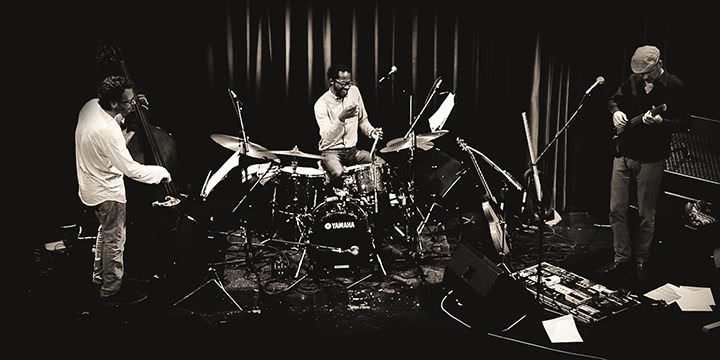Jazz is a peculiarly blighted genre. Even though youthful game-changers like Kamasi Washington and Badbadnotgood are sneaking out of the shadows and into the popular consciousness, the form is still stereotyped.
In the public eye, it continues to be regarded as an antiquated thing, a gas lamp in a sea of flashlights, performed by sad sacks in leather-patched corduroy jackets.
And yet if there’s any musician ready to definitively prove the genre’s cutting-edge credentials, it’s celebrated Austrian guitarist Wolfgang Muthspiel. Not only does the man create urgent, elegant music – beautiful tunes with all the energy of fire alarms – he doesn’t talk about jazz as though it is a hobby, or a way to pay the bills. Simply put, Wolfgang Muthspiel talks about jazz the way priests talk about God.
He’s also, perhaps more surprisingly, an extremely funny man. When asked to offer up a piece of information he’s never mentioned in an interview before, he doesn’t reveal some long-lost nugget of jazz wisdom. Rather, he uses the opportunity to talk about his experiences with late-night shopping channels. “I once ordered a motivational video from the TV called Unleash Your Inner Dragon,” he laughs, before adding: “And I have 20 hats.”
Fedoras, dragons and jazz aside, Muthspiel’s other big love is his family. Indeed, his passion for music is an inherited trait. “My father was an amateur choir conductor who burned for music, and made it very attractive for us,” Muthspiel says. “We are four children and three of us became musicians. At 14, after having quit the violin, which I started at six, and having had some affinity for the guitar, I practised by myself and was accepted at university. That was [much] to my own surprise. From then on, music saved me from other troubles and became the centre of my life.”
Muthspiel’s family has also come to play a role in his creative practice – he frequently performs with his brother Christian, a celebrated trombonist and pianist. In 2003, the pair released the plainly titled and widely lauded Early Music, an album of striking beauty enhanced by the brothers’ deep bond. “Blind understanding helps [Christian and I] when we are playing, of course,” Muthspiel says. “Luckily we also find many other musical brothers and sisters on our way.”
These “brothers and sisters” Muthspiel mentions aren’t merely session musicians – they are out-and-out legends in their own right. The jazz guitarist has collaborated with the likes of double bassist Gary Peacock and saxophonist Bob Berg, and he is a member of a number of jazz supergroups, most notably the award-winning trio MGT.
That said, there are certain musicians Muthspiel holds in particularly high regard. “Most of what I learned in music, I learned from playing with masters like Paul Motian, Brian Blade and Gary Burton,” he says. “Apart from knowing the instrument, which one has to figure out alone, these people taught me without words about music, about time and about performing.”
The art of playing live is something that Muthspiel has had to truly work at, and the concentration required to perform the draining marathon sets that have become his trademark is an acquired skill and not a gift. After all, the average length of Muthspiel’s compositions is well over ten minutes, and sustaining any significant output of energy over that period of time is as much a question of physical endurance as it is anything more intellectualised.
“As a kid I loved playing live and was never nervous,” Muthspiel says. “But later it became harder and now it is difficult, though [it’s a] healing experience. [You have] to aspire to be in the moment when you are playing.”
Despite the hardships associated with it, playing stages around the world has afforded Muthspiel the opportunity to note subtle differences in audience etiquette, and he remains fascinated by the ways in which people from different countries appreciate his fluid, finessed melodies.
“Australian audiences are very warm and eager to be entertained,” he says. “They seem non-judgemental and open. A place like Poland [also] has a great audience, for example – the people are extremely knowledgeable and into the [parts] of the songs that the musicians like themselves.”
As far as Muthspiel is concerned, the main drawcard of jazz is its ability to rebel against structure. It is a function without a form, a genre that is at its best when the people playing it read, then disregard, the rule book. “I know that what a good jazz musician can bring to any music is a kind of spontaneous arranging of the music. That’s not only of a certain song, but of each specific [element] of that one song. It’s a quality that cannot not be achieved by planning and thought, but only by intuition.”
Yet despite how important it might be for him personally, Muthspiel understands that there are some who still see the genre as difficult. But naysayers need not worry – Muthspiel has a foolproof guide to loving jazz.
“I would say, open a good bottle of red wine and put on Bill Evans’ Sunday At The Village Vanguard. Listen with good headphones or good speakers. [Play] it loud. Next time, next bottle, try a younger artist like Ambrose Akinmusire. Listen uninterrupted for some time. Don’t look for the [prettiness] – just listen. And if you enjoy that… well, there’s a big universe waiting for you.”
The City Recital Hall hosts the Wolfgang Muthspiel Trio on Tuesday August 9.

































